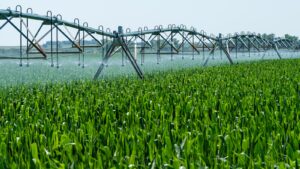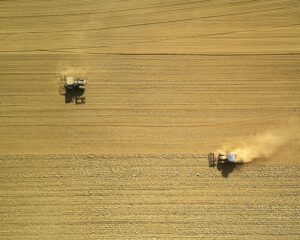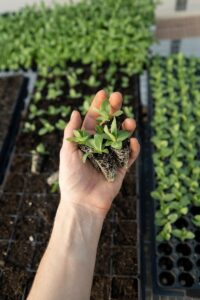IoT Technology for Farm Resource Optimization: Enhancing Efficiency and Sustainability
IoT technology for farm resource optimization has revolutionized the way modern agriculture operates, providing farmers with the tools needed to continuously monitor and optimize their resources and inputs. As the agricultural sector in regions like Saudi Arabia and the UAE seeks to enhance productivity while ensuring sustainability, the adoption of IoT technology has become a critical component in achieving these goals. By integrating IoT-enabled sensors and devices into farming operations, farmers can collect real-time data on various aspects of their farms, enabling them to make informed decisions that optimize resource use and improve overall farm performance.
In Saudi Arabia, where water scarcity and extreme weather conditions pose significant challenges to agriculture, IoT technology offers a solution by providing precise data on soil moisture levels, temperature, and humidity. This data allows farmers to implement precision irrigation techniques, ensuring that water is used efficiently and only where it is needed most. By optimizing water usage, farmers not only reduce waste but also enhance crop yields, contributing to food security in the region. Additionally, IoT sensors can monitor soil nutrient levels, enabling farmers to apply fertilizers more effectively and minimize the environmental impact of agricultural practices.
The benefits of IoT technology for farm resource optimization extend beyond water and nutrient management. In the UAE, where smart farming initiatives are gaining momentum, IoT devices are being used to monitor and control greenhouse environments. By continuously tracking temperature, humidity, and light levels, these devices help maintain optimal growing conditions for various crops, reducing the risk of disease and improving crop quality. Furthermore, IoT technology can automate processes such as ventilation and irrigation, reducing the need for manual labor and allowing farmers to focus on other critical aspects of farm management. This level of automation not only increases efficiency but also enhances the sustainability of farming practices by minimizing resource use.
Data-Driven Decision Making: The Future of Agriculture in Saudi Arabia and the UAE
The integration of IoT technology in agriculture is not just about optimizing resources; it’s about transforming the entire decision-making process. In Riyadh and Dubai, where agricultural innovation is a priority, IoT-enabled systems are providing farmers with real-time insights that are driving data-driven decision-making. This shift from traditional farming methods to smart farming is enabling farmers to respond to changing conditions more quickly and effectively, ultimately leading to better outcomes.
For instance, IoT technology can provide real-time alerts on potential issues such as pest infestations or crop diseases. By detecting these problems early, farmers can take immediate action to mitigate damage, reducing the need for chemical pesticides and improving crop health. In Dubai, where sustainable farming practices are increasingly important, this approach aligns with broader environmental goals and helps ensure that agriculture can continue to thrive in a rapidly changing climate. Moreover, the data collected by IoT devices can be analyzed to identify trends and patterns, allowing farmers to anticipate future challenges and plan accordingly.
In addition to improving on-farm decision-making, IoT technology also facilitates better supply chain management. In Saudi Arabia, where the efficient distribution of agricultural products is crucial, IoT-enabled systems can track the movement of goods from farm to market, ensuring that products reach consumers at peak freshness. This real-time tracking not only enhances the quality of agricultural products but also reduces waste by preventing spoilage. Furthermore, by providing transparency and traceability throughout the supply chain, IoT technology helps build trust between producers and consumers, which is essential for the continued growth of the agricultural sector.
The Impact of IoT Technology on Sustainable Farming Practices
Promoting Sustainability through Precision Agriculture
One of the most significant impacts of IoT technology on agriculture is its ability to promote sustainability through precision agriculture. In regions like the UAE and Saudi Arabia, where sustainable resource management is a priority, IoT-enabled systems are helping farmers reduce their environmental footprint while maintaining high levels of productivity. By providing precise data on crop needs, IoT technology allows farmers to apply inputs such as water, fertilizers, and pesticides with pinpoint accuracy, minimizing waste and reducing the impact on surrounding ecosystems.
For example, precision agriculture techniques enabled by IoT devices can significantly reduce water usage in arid regions. In Saudi Arabia, where water resources are limited, smart irrigation systems that use IoT sensors to monitor soil moisture levels have been shown to reduce water consumption by up to 30%. This not only conserves a vital resource but also lowers production costs, making farming more economically viable. Similarly, the precise application of fertilizers and pesticides reduces runoff and contamination of nearby water bodies, contributing to the preservation of local ecosystems.
Furthermore, IoT technology supports the adoption of renewable energy sources in agriculture. In Dubai, where sustainability is a key focus, solar-powered IoT devices are being used to monitor and manage farm operations, reducing the reliance on non-renewable energy sources. This shift towards renewable energy not only aligns with global sustainability goals but also provides farmers with a more stable and cost-effective energy supply, particularly in remote areas. By integrating IoT technology with renewable energy, farmers can create a more resilient and sustainable agricultural system that is better equipped to withstand the challenges of the future.
Conclusion: The Future of Agriculture Lies in IoT-Enabled Smart Farming
In conclusion, IoT technology for farm resource optimization is revolutionizing agriculture in regions like Saudi Arabia and the UAE. By providing real-time data and enabling precision agriculture, IoT-enabled systems are helping farmers optimize their resources, enhance sustainability, and improve overall farm performance. As the agricultural sector continues to evolve, the adoption of IoT technology will be essential in meeting the growing demand for food while minimizing environmental impact. The future of agriculture lies in smart farming, where data-driven decision-making and sustainable practices go hand in hand, ensuring a prosperous and resilient agricultural industry for generations to come.
—
#SmartFarming #IoTAgriculture #PrecisionAgriculture #SustainableFarming #SaudiArabia #UAE #FarmResourceOptimization #IoTInFarming #ModernAgriculture #AgricultureInnovation













